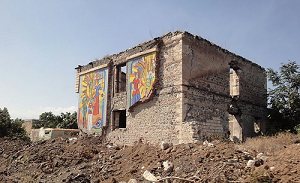A Year After The “Four-Day War”, Guns Continue to Speak Louder than Diplomats in Nagorno-Karabakh
By Azad Garibov
April 21, 2017, the CACI Analyst
One year has passed since the “Four-Day War” – an unprecedented escalation of the Nagorno-Karabakh conflict on April 1-5, 2016 that claimed the lives of over a hundred soldiers on both sides. The conflict over Nagorno-Karabakh has never been truly frozen, yet the increased intensity of clashes since April 2016 demonstrates that violence can flare up at any time, destabilizing the already fragile region. As no peaceful solution is visible on the horizon, the Line of Contact (LoC) between Azerbaijan’s and Armenia’s armed forces has become the most militarized area of the former Soviet Union. Azerbaijani and Armenian societies have also grown increasingly nationalistic as fighting intensifies and casualty rates grow on the frontline.

The anti-ISIS coalition and Armenia's foreign policy options
By Eduard Abrahamyan
September 30th, 2015, The CACI Analyst
Since a few months, Armenia’s civil society, expert community and military are debating the threat that the terrorist organization calling itself the Islamic State (ISIS) poses to Armenia. In parallel, disillusionment is growing with the Russia-led Collective Security Treaty Organization (CSTO) and its reaction to the escalation in tensions between Armenia and Azerbaijan. Since at least three out of six CSTO members continually sell arms to Azerbaijan, it is now disputed whether the organization is capable and willing to ensure Armenia’s security. In this atmosphere, the idea has recently emerged that Armenia could reduce its dependence on Russia and restore relations with the West by joining the global coalition against ISIS.




